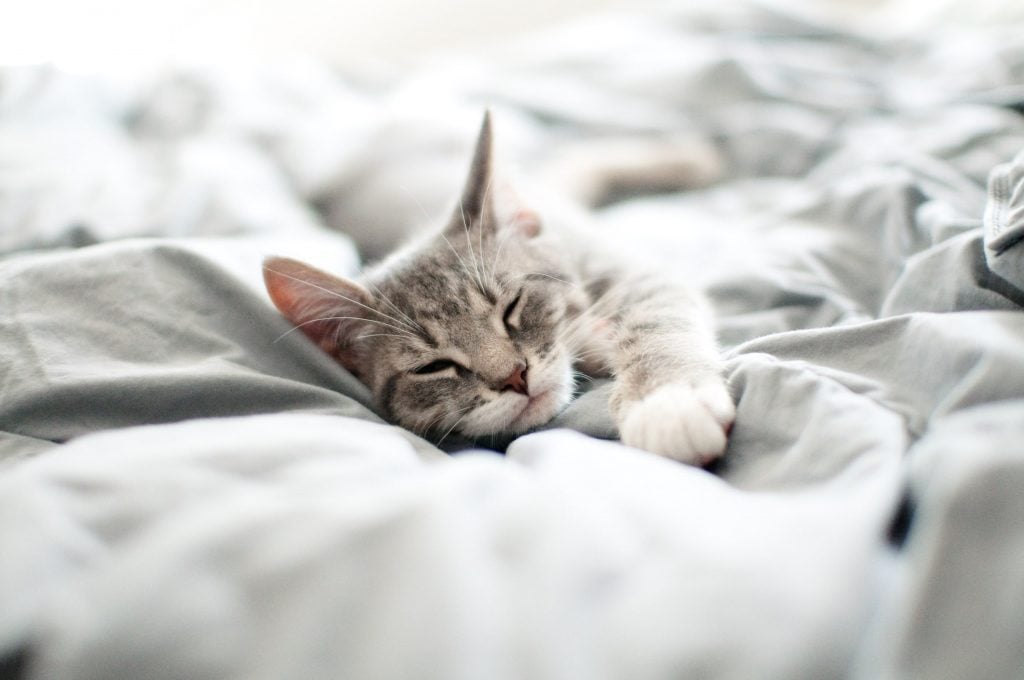If you hear a little kitty ah-choo or two, you might be thinking it’s time for a trip to the vet. But Dr. Rebecca Greenstein, Rover Dog People panelist and Chief Veterinarian at Kleinburg Veterinary Hospital, says not all sneezes mean your cat is feeling ill.
“Sneezing is a common reflex in response to nasal irritants.” Dr. Greenstein says. “Occasional sneezing in an otherwise healthy cat can be entirely normal, especially if they happen to be around dust or other particulates in the air, or if they’ve been sniffing around a lot.” But, if your cat has chronic sneezing or shows other changes in behavior, there might be something else going on.
Reasons Why Your Cat Is Sneezing
“Anything from allergies to infections to foreign bodies to nasal polyps or tumors can cause upper respiratory signs,” Dr. Greenstein explains. Here’s a quick overview of what those conditions can look like in your cat—and when it’s time to see the vet.
1. It’s a Normal Response to the Environment
If your cat sneezes once or twice, he probably has a tickle from dust or an irritating particle in his nose. Ponderosa Veterinary Clinic has some tips for keeping your cat sneeze-free:
- Strong scents can be irritating to your cat’s sensitive nose. Scented candles, air fresheners, certain laundry detergents, and smoking can all trigger sneezing in your cat.
- Just like humans, dust can cause an onset of sneezes. One likely culprit is your cat’s litter box. You may want to consider a low or dust-free cat litter to see if it helps with your kitty’s sniffles.
- Chemicals and perfumes in some cleaning products can be irritating to the nose and induce sneezing in your cat. Next time, try a scent-free or low odor pet-safe home cleaning product.
2. Your Cat Has Allergies
According to VCA Hospitals, there are four common types of allergies in the cat: insect (fleas), food allergy, inhalant (house dust, pollen, and molds), and contact (“a local reaction on the skin from contact with an allergic substance [such as] shampoos, flea collars, or certain types of bedding”).
Only one type of allergy, inhalant, is known to cause sneezing, coughing, wheezing, and eye discharge in cats. Just like in humans, you might notice that your cat’s sneezing is seasonal (ragweed, cedar, and grass pollens), or he could have all-year-round allergies (molds, mildew, and dust mites). If your cat’s allergies are severe, talk to your vet about possible treatment including vet-prescribed antihistamines.
3. Your Cat Has Kennel Cough
Dogs aren’t the only ones who can catch kennel cough, the bacterial infection also known as Bordetella. If you recently adopted your cat from a shelter, if you recently boarded your cat, or if your kitty had contact with a clowder of cats, he could have picked up the kennel cough bug.
According to BondVet, kennel cough is highly contagious between pets, even cats and dogs, so it’s best to keep any pets who may have kennel cough isolated from healthy ones. And don’t forget to wash any toys and bowls that a pet with kennel cough may have used.
Sneezing may sound like an unusual symptom for an infection that has cough in its name, but cats don’t always have a cough when they’re infected. Instead, your cat might sneeze, have nasal and eye discharge, and could run a fever. Kennel cough usually runs its course like a cold does in a human, but if symptoms worsen or persist, it’s time to call your vet.
4. Your Cat Has an Upper Respiratory Infection (URI)
Kennel cough is a type of URI and is the most common URI caused by bacteria, but there is a whole slew of URIs that could affect your cat caused by bacteria or viruses. The most common viral URIs, according to VCA Hospitals, are the feline herpesvirus type-1 (also known as feline viral rhinotracheitis or FVR) and feline calicivirus (FCV). The onset of each virus typically presents as sneezing, nasal congestion, a fever, and sometimes drooling. Persistent URIs can cause complications, so it’s best to give your vet a call for treatment options.

Konstantin Aksenov/iStock
5. Your Cat Has a Polyp
Polyps are benign, fleshy growths that can develop in a cat’s nose, ear canal, or mouth and are most common in younger cats. Polyps in the nose can cause upper respiratory symptoms such as sneezing, nasal discharge, reverse sneezing, snoring, and breathing difficulties. Nasal polyps are typically removed via surgery and might require anti-inflammatories to prevent the regrowth of the polyp.
6. Your Cat Has Something Stuck in Their Nose
Your cat might be sneezing because he’s trying to dislodge something from his nose. Accidentally sniffing up a foreign object like a blade of grass or snippet of fabric could cause irritation and the need to sneeze it out. If your cat can’t sneeze out the irritant, he might need a vet to flush it out.
7. Your Cat Has Dental Disease
Cats with dental disease are prone to sneezing, according to the experts at Caring Heart Animal Hospital. According to this article about cat sneezing on its blog, “dental disease that affects the teeth, gums, and even the roof of the mouth can all lead to sneezing and other respiratory symptoms.”
Just like with humans, dental disease prevention starts with regular dental hygiene.
8. Your Cat Is a Chronic Sneezer
My very first foster cat, Buddy, was a chronic sneezer—and had no shame in shooting snot everywhere. He was otherwise healthy and his team of veterinarians found no cause, or cure, for his sneezes.
In her article, “How to Survive the Cat With Chronic Sneezing,” Dr. Susan Little, DVM, DABVP, calls the condition chronic rhinosinusitis (CRS). She explains that cats with this condition could have a history of viral infections, like feline herpesvirus, or none at all. Diagnosis of CRS can only be confirmed after your vet rules out a long list of other plausible reasons for your cat’s sneezing.
Could My Cats Have Coronavirus?
Feline coronavirus or FCoV is a type of URI that can spread between cats and is different than the strain that causes COVID-19. Some cats have no symptoms of the virus. Others show signs of upper respiratory distress (like coughing, sneezing, and a runny nose) and have mild diarrhea. Like most URIs, feline coronavirus is self-limiting and should run its course like a cold.
Feline infectious peritonitis virus or FIVP is a rare mutation of feline coronavirus. The mutation occurs in about ten percent of cats who have contracted feline coronavirus. This mutated virus could spread throughout a cat’s body. If it does spread, the disease is called feline infectious peritonitis (FIP) and results in severe inflammation of critical organs. Depending on the type of FIP, symptoms include:
- A rising and falling fever
- Lack of appetite and weight loss
- Lethargy
- Lesions
- Seizures
- Uncoordinated movements
- Excessive thirst and urination
- Jaundice
COVID-19 and cats: “COVID in pets is still an area of very active research, and our understanding evolves almost every month as new studies emerge,” Dr. Greenstein says. What we do know is that infection can occur in humans and pets.
The symptoms of COVID in cats can vary, but known cases have reported sneezing, upper respiratory signs, and sometimes difficulty breathing.
“If a cat owner is diagnosed with COVID-19, they should be mindful that their cats are also likely exposed and may become symptomatic, so they should be kept away from another and monitored closely,” says Dr. Greenstein. If you notice what may be the symptoms of COVID-19 in your cat, it’s best to seek advice from your vet.
What Do I Do If My Cat Sneezes Blood?
If your cat has been fighting a URI for a while, bloody discharge could be a sign that the blood vessels in his nose are rupturing, and your cat should see the vet for relief. Other reasons your cat could have bloody discharge could be more serious and will require a vet visit, especially if the bleeding starts suddenly with no other symptoms, or is persistent.

hamacle/iStock
The Takeaway
Sneezing in cats has many root causes—and not all of them call for a trip to the vet. If you have concerns, note how often your cat sneezes and any environmental factors that might cause nasal irritation. If his sneezes become more and more common or if he shows other symptoms or behavioral changes, seek professional help from your trusted veterinarian.
